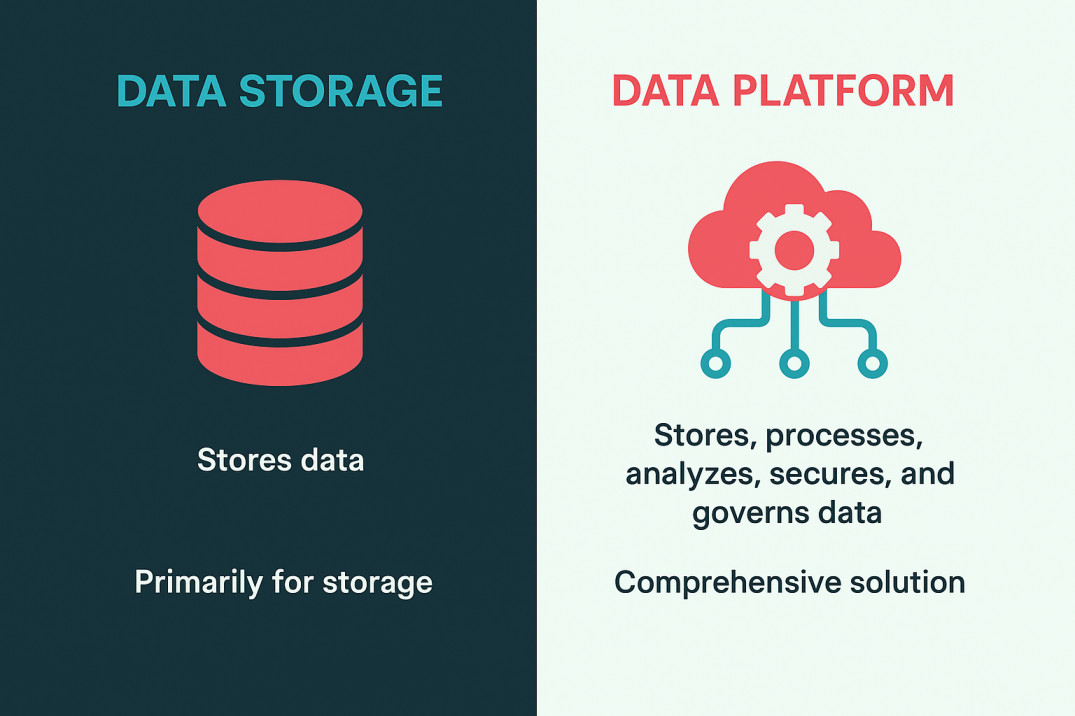In today’s data-driven world, businesses need more than just a place to store their data. They require solutions that not only keep their data secure but also make it actionable. This is where data platforms come into play. The shift from traditional data storage solutions to intelligent data platforms is a game-changer for how businesses manage and leverage their data. In this article, we’ll explore why a data platform is essential for modern businesses, and highlight the key differences between data storage and a data platform.

Data Storage vs. Data Platform: What’s the Difference?
On the other hand, a data platform is a much more comprehensive solution. It integrates functions such as data classification, governance, protection, and automation, turning raw data into actionable insights. A data platform not only stores data but also processes, analyzes, secures, and governs it in real-time, helping businesses make smarter decisions.
Why a Data Platform is More Than Just Storage
While data storage systems keep data safe, data platforms like STORViX’s AiRE go a step further. They allow businesses to classify, organize, and secure data efficiently, providing real-time insights and ensuring compliance with data protection regulations.
According to Gartner’s “Top Trends in Enterprise Data Platforms” (2024), by 2028, 40% of companies will use Data Storage Management Services (DSMS) platforms to classify, automate, secure, and optimize storage. This highlights the shift towards platforms that actively manage data, reducing complexity and mitigating compliance risks. For businesses adopting these platforms, the benefits are clear – faster processing times, enhanced security, and reduced operational costs.STORViX’s AiRE platform is an example of such a data platform. Companies using AiRE have experienced these benefits firsthand, transforming their data management and improving decision-making processes.

The Role of Automation in Data Platforms
One of the key differences between data storage and data platforms is the integration of automation. Data platforms allow businesses to automate key data management tasks like data governance, compliance, and anomaly detection. This frees up valuable resources, enabling teams to focus on more strategic work.Gartner’s “Top Recommendations for Data Storage and Management” (2024) highlights that automated features in data platforms can significantly reduce the “hidden cost” of unstructured data, which traditionally consumes large amounts of resources without providing value. With automation, businesses are able to streamline operations, reduce manual errors, and improve efficiency, allowing for faster decision-making and business agility.

Digital Transformation Powered by Data Platforms
Data platforms are at the core of digital transformation. By centralizing and managing data, businesses unlock new opportunities for predictive analytics, personalized customer experiences, and operational optimization. A robust data platform empowers businesses to turn their data into a strategic asset.Gartner’s “Strategic Roadmap for Data and Analytics” (2024) underscores that the future of data management is no longer passive. The future is active, intelligent, and strategic.
Why Traditional Data Storage Isn’t Enough
As businesses continue to accumulate vast volumes of data, traditional data storage systems become inadequate. They only store data, leaving the complex tasks of data analysis, security, and management to other solutions. A data platform, however, integrates these functions in one comprehensive solution, ensuring that businesses can derive full value from their data.Gartner’s “Magic Quadrant for Cloud Storage” (2024) suggests that by 2028, hybrid cloud storage will become the norm for IT leaders. A data platform that seamlessly integrates with both cloud and on-premise storage solutions is essential for staying competitive in this evolving landscape.
Real-World Use Cases: STORViX in Action
STORViX has successfully helped companies across various market verticals streamline their data management, reduce operational costs, and enhance efficiency. By integrating intelligent data management capabilities into their operations, these companies have transformed how they interact with their data, ensuring better insights and decision-making.
Learn more about these success stories here: Customer Stories.
To learn more about how STORViX can help you transition from basic data storage to a powerful data platform, contact us for a personalized demo.
Gartner References:
- Gartner’s “Top Trends in Enterprise Data Platforms” (2024):
Gartner. Top Trends in Enterprise Data Platforms.
(By 2028, 40% of companies will use Data Storage Management Services (DSMS) platforms to classify, automate, secure, and optimize storage.) - Gartner’s “Top Recommendations for Data Storage and Management” (2024):
Gartner. Top Recommendations for Data Storage and Management.
(Automated features in data platforms can significantly reduce the “hidden cost” of unstructured data.) - Gartner’s “Strategic Roadmap for Data and Analytics” (2024):
Gartner. Strategic Roadmap for Data and Analytics.
(The future of data management is active, intelligent, and strategic.) - Gartner’s “Magic Quadrant for Cloud Storage” (2024):
Gartner. Magic Quadrant for Cloud Storage.
(Hybrid cloud storage will become the norm for IT leaders by 2028.)

